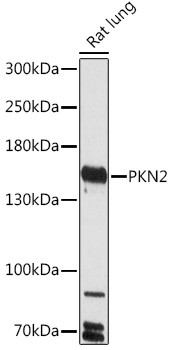Cell Biology Antibodies 18
Anti-PKN2 Antibody (CAB18373)
- SKU:
- CAB18373
- Product Type:
- Antibody
- Reactivity:
- Mouse
- Reactivity:
- Rat
- Host Species:
- Rabbit
- Isotype:
- IgG
- Research Area:
- Cell Biology
Description
| Antibody Name: | Anti-PKN2 Antibody |
| Antibody SKU: | CAB18373 |
| Antibody Size: | 20uL, 50uL, 100uL |
| Application: | WB |
| Reactivity: | Mouse, Rat |
| Host Species: | Rabbit |
| Immunogen: | Recombinant protein of human PKN2. |
| Application: | WB |
| Recommended Dilution: | WB 1:500 - 1:2000 |
| Reactivity: | Mouse, Rat |
| Positive Samples: | Rat lung |
| Immunogen: | Recombinant protein of human PKN2. |
| Purification Method: | Affinity purification |
| Storage Buffer: | Store at -20°C. Avoid freeze / thaw cycles. Buffer: PBS with 0.02% sodium azide, 50% glycerol, pH7.3. |
| Isotype: | IgG |
| Sequence: | Email for sequence |
| Gene ID: | 5586 |
| Uniprot: | Q16513 |
| Cellular Location: | |
| Calculated MW: | 75kDa/94kDa/106kDa/110kDa/112kDa |
| Observed MW: | 140kDa |
| Synonyms: | PAK2, PRK2, PRKCL2, PRO2042, Pak-2, STK7, PKN2 |
| Background: |
| UniProt Protein Function: | PKN2: an AGC kinase of the PKN family. A PKC-related serine/threonine-protein kinase and Rho/Rac effector protein. Plays a role in the regulation of cell cycle progression, actin cytoskeleton assembly, cell migration, cell adhesion, tumor cell invasion and transcriptional activation. Phosphorylates CTTN in hyaluronan-induced astrocytes and hence decreases CTTN ability to associate with filamentous actin. Phosphorylates HDAC5, therefore lead to impair HDAC5 import. Direct RhoA target required for the regulation of the maturation of primordial junctions into apical junction formation in bronchial epithelial cells. Required for G2/M phases of the cell cycle progression and abscission during cytokinesis in an ECT2-dependent manner. Stimulates FYN kinase activity that is required for establishment of skin cell-cell adhesion during keratinocytes differentiation. Regulates epithelial bladder cells speed and direction of movement during cell migration and tumor cell invasion. Inhibits Akt pro-survival-induced kinase activity. Mediates Rho protein-induced transcriptional activation via the c-fos serum response factor (SRF). Phosphorylates HCV NS5B leading to stimulation of HCV RNA replication. Kinase activity is activated upon binding to GTP-bound Rhoa/Rac1 GTPases. Activated by limited proteolysis with trypsin, and withn caspase-3 (CASP3) during apoptosis. Activated by lipids, particularly cardiolipin and to a lesser extent by other acidic phospholipids and unsaturated fatty acids. Colocalizes with PTPN13 in lamellipodia-like structures, regions of large actin turnover. Accumulates during telophase at the cleavage furrow and concentrates finally around the midbody in cytokinesis. Recruited to nascent cell-cell contacts at the apical surface of cells. In the course of viral infection, colocalizes with HCV NS5B at perinuclear region in the cytoplasm. Five isoforms of the human protein are produced by alternative splicing. |
| UniProt Protein Details: | Protein type:EC 2.7.11.13; Protein kinase, AGC; Kinase, protein; Protein kinase, Ser/Thr (non-receptor); AGC group; PKN family Chromosomal Location of Human Ortholog: 1p22.2 Cellular Component: nucleoplasm; apical junction complex; centrosome; intermediate filament cytoskeleton; lamellipodium; perinuclear region of cytoplasm; cytoplasm; plasma membrane; midbody; cell junction; nucleus; cleavage furrow Molecular Function:protein serine/threonine kinase activity; protein binding; protein kinase C activity; histone deacetylase binding; kinase activity; ATP binding; protein kinase activity Biological Process: positive regulation of cytokinesis; positive regulation of viral genome replication; apical junction assembly; transcription, DNA-dependent; regulation of transcription, DNA-dependent; cell division; apoptosis; positive regulation of mitotic cell cycle; signal transduction; cell adhesion; cell cycle; protein amino acid phosphorylation |
| UniProt Code: | Q16513 |
| NCBI GenInfo Identifier: | 6225859 |
| NCBI Gene ID: | 5586 |
| NCBI Accession: | Q16513.1 |
| UniProt Related Accession: | Q16513 |
| Molecular Weight: | Observed: 140 kDaPredicted: 113 kDa |
| NCBI Full Name: | Serine/threonine-protein kinase N2 |
| NCBI Synonym Full Names: | protein kinase N2 |
| NCBI Official Symbol: | PKN2 |
| NCBI Official Synonym Symbols: | PAK2; PRK2; STK7; Pak-2; PRKCL2; PRO2042 |
| NCBI Protein Information: | serine/threonine-protein kinase N2 |
| UniProt Protein Name: | Serine/threonine-protein kinase N2 |
| UniProt Synonym Protein Names: | PKN gamma; Protein kinase C-like 2; Protein-kinase C-related kinase 2 |
| Protein Family: | Serine/threonine-protein kinase |
| UniProt Gene Name: | PKN2 |
| UniProt Entry Name: | PKN2_HUMAN |







